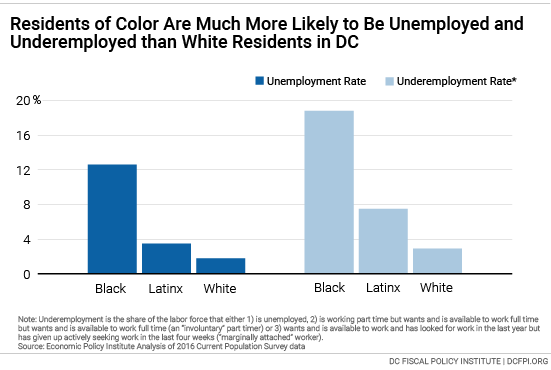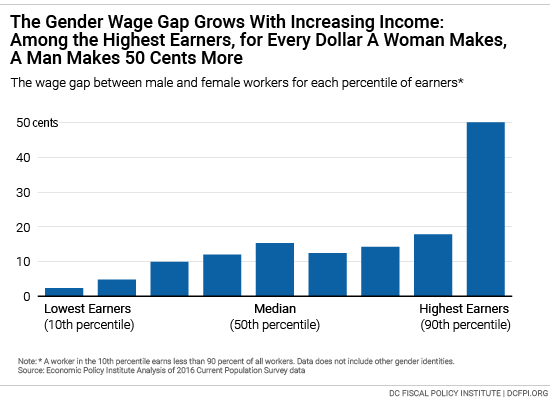In many ways, the District of Columbia is an economic powerhouse, with the fastest job growth in the region and lots of jobs with good wages. But that is not the way the DC economy looks to everyone. Many Black residents remain out of work despite actively looking—resulting in a growing Black-White unemployment gap. And female DC residents get paid less than their male counterparts, especially when it comes to middle- and high-wage jobs.
This is troubling, because a key public policy goal—especially in a city as economically robust as the District—should be quality employment for everyone who wants to work.

DC’s Racial/Ethnic Employment Disparities Are Stark
Seven years into an economic recovery, Black workers in DC face an unemployment rate that looks more like what would be expected in a recession.
- Some 13 percent of Black workers in DC were unemployed in 2016, compared with just 3.5 percent for Latinx workers and less than 2 percent for White workers.
- Nearly one in five Black workers were under-employed last year—meaning they were looking for a job, working in a job with fewer hours than desired, or too discouraged to look for work. Some 7.5 percent of Latinx workers were in this situation, but less than 3 percent of White workers were.
- On top of that, half of Black workers who look for a job spend at least 6 months looking before finding one—and therefore are considered “long-term” unemployed.
DC’s Women Make Less than Men
Women and men in DC earn about the same in the lowest-wage jobs, those that are at or close to the minimum wage. But there is a big wage gap in the rest of the earnings scale, especially for the top-earning workers.
- The median wage for working DC women is $25 an hour, well below the $29 per hour median for men who live in DC. (The median is the mid-point of the earnings scale.)
- The top 10 percent of DC men earn over $86 an hour, while the top 10 percent of women make $57 an hour or more. The large gap at the high end of the wage scale may be due to the “glass ceiling” effect, where women remain at mid-level jobs and are much less likely to advance to managerial and higher positions than their male counterparts.

These employment and wage gaps reflect a number of factors, but at the most fundamental level they result from discrimination and a historic and systemic denial of equal access to education and job opportunities for people of color and women. In any economy, but especially a strong one like DC, access to jobs with good pay and benefits is a key measure of fairness. The employment and wage gaps are a powerful reminder of why we must continue to work to break down barriers to good jobs.
To print a copy of today’s blog, click here.
